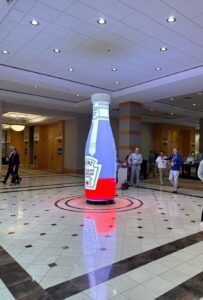
I recently had the opportunity to attend this year’s Restaurant Leadership Conference (RLC) in Phoenix, and it was an incredible few days connecting with leaders who are truly shaping the future of the restaurant industry. From high-energy keynotes and data-packed sessions to casual conversations in the hallways, the event was a powerful reminder of how much we can learn from one another—especially in times of change.
This recap captures some of the top insights, stories, and strategies I took away from RLC 2025. Whether you made it to the conference or not, I hope it brings you right into the room and gives you a few ideas to take back to your team.
-Steven Cook, Cofounder of Force4Good
The 2025 Restaurant Leadership Conference (RLC) brought together the top minds in the restaurant industry to tackle what’s shaping up to be one of the most complex years in recent memory. From inflation and declining traffic to AI disruption and shifting consumer expectations, this year’s sessions made one thing clear: uncertainty is here to stay – but so is opportunity.
Here’s a deeper dive into some of the most powerful insights and memorable moments from three packed days in the desert.
CEO vs. CEO: Culture-Driven Brands Win
The opening session featured a candid and compelling conversation between Michael Osanloo, CEO of Portillo’s, and Christine Barone, CEO of Dutch Bros Coffee. Moderated by Joe Guszkowski of Restaurant Business, the session set the tone for the event.
Key takeaways:
- People power the brand: Both companies tie leadership directly to operational experience. At Portillo’s, general managers must have at least a year of experience with the brand before opening a new location. At Dutch Bros, all executives—including Christine herself—start out as broistas.
- Digital loyalty is a game-changer: Dutch Bros sees over 70% of transactions come from loyalty members, offering a strong platform for customer engagement and growth.
- Operational feasibility matters: Portillo’s pulled the plug on a plant-based mushroom sandwich—not because it wasn’t delicious, but because only 5% of employees could prepare it consistently. If it doesn’t work in the real world, it doesn’t make it to the menu.
Technomic’s Industry Forecast: Bracing for the Unknown
In one of the most data-driven sessions, Technomic’s team walked through the numbers and trends shaping the industry.
The bad news:
- Traffic is soft: February 2025 marked the sharpest traffic decline (-4.9%) in over a year.
- Cost pressures persist: While menu inflation has slowed, raw material costs rose 5.9% in February alone.
- Consumer confidence is shaky: Diners are cautious, and their wallets show it.
The bright spots:
- Operators remain resilient: Despite challenges, many brands report growth through smarter planning and innovation.
- Fast casual is the growth category: Especially those focused on chicken, Mexican, and beverage/snack segments.
- Future outlook? Cautiously optimistic. Technomic’s advice: don’t try to predict the future—plan for multiple possible outcomes and stay nimble.
Mark Wahlberg: Faith, Family, Fitness & Focus
Hollywood icon and entrepreneur Mark Wahlberg brought energy, humor, and humility to his fireside chat, where he reflected on his journey from movie sets to restaurant investments.
Highlights:
- Start the day with purpose: Mark begins each morning at 2:45am with prayer, a workout, and time with his family—setting the tone for a purpose-driven life.
- Authenticity over hype: With Flecha Azul Tequila, he invested not in a marketing story, but in a real founder’s journey. “The truth is always better than fiction,” he said.
- Build what matters: Wahlburgers and Alma Nove aren’t about celebrity—they’re about bringing people together around the table. The Wahlberg Foundation is a core part of his mission to give back.

The Franchisee Perspective: Smart, Scrappy, and Strategic
Some of the most practical insights came from franchisees and multi-unit operators like Thrive Restaurant Group, Sizzling Platter, and Franchise Equity Partners. These operators are closer than anyone to the challenges of the front line—and are often the ones driving innovation.
Lessons learned:
- Plan ahead—way ahead: Thrive purchased extra equipment in anticipation of tariff hikes, avoiding cost spikes and delays.
- Care for the whole person: Thrive also provides access to third-party mental health support for employees, investing in retention through real human connection.
- Franchisees are the test kitchen: Letting operators test AI, loyalty programs, or new menu items in real-world settings is yielding faster learnings and smarter scaling.
The Local Store Marketing Playbook: Empowered Operators Win
Another session packed with actionable takeaways was “How Not To Suck at Local Store Marketing,” featuring leaders from RRD, Emmy Squared, Taziki’s, and more. The message was clear: local marketing isn’t about flashy campaigns – it’s about consistency, relevance, and empowering the people closest to the guest.
Lessons learned:
- Speed matters: Reducing “days to second visit” significantly increases guest lifetime value—get them back quickly, and they’re more likely to stay.
- Think small to win big: Focus on what’s right around you—four walls, four blocks, four miles—and tailor plans to each location’s unique community.
- Set your GMs up for success: Equip operators with plug-and-play images, assets, and tools so they can show up in the community confidently, without needing to create from scratch.

Chili’s Comeback Story: Kevin Hochman’s Leadership Blueprint
Restaurant Leader of the Year Kevin Hochman, CEO of Brinker International, received a well-deserved standing ovation as he walked through Chili’s incredible turnaround story.
In one year:
- +31% sales growth
- 10+ point improvement in guest satisfaction
- Massive operational improvements—from cleanliness to employee morale
Kevin’s leadership principles:
- “Don’t debate what to do. Debate how to fund what’s right.”
- “Employees can’t follow a fuzzy vision. Show the steps and how they’re part of it.”
- “Celebrate the little things—sometimes with a golden ticket and a candy bar, even if you’re dressed like Willy Wonka.”

The Real Competitive Advantage: Culture
Across multiple sessions—from Donatos Pizza to Hawaiian Bros and White Castle—one theme came up over and over again: Culture is everything.
Why it matters:
- Younger workers want more than a paycheck: They value fun, flexibility, and the potential for growth.
- Culture supports retention: Donatos increased average retention from 17 to 100 days during COVID, thanks to stronger support systems.
- Lead from the front: White Castle CEO Lisa Ingram still works the grill occasionally. “It keeps me grounded and reminds me why we do this.”
Trends to Watch: Loyalty, AI, and Local Ownership
Beyond the mainstage, conversations buzzed around key emerging trends:
- “Days to Second Visit” is the new golden metric in loyalty marketing. Getting guests back fast is more valuable than just enrolling them in a points program.
- AI is already here: From automated upselling to drive-thru recognition, smart tools are quietly revolutionizing operations.
- Hyperlocal marketing matters: Corporate teams should give GMs tools to market to their own communities. Local engagement drives repeat visits and brand love.
Closing Keynote: Gabby Thomas on Resilience and Identity
Olympic medalist Gabby Thomas wrapped up the conference with a powerful reminder: It’s not about how fast you go—it’s about how you come back.
Her story of training setbacks, mental health struggles, and purpose-driven motivation resonated deeply with an audience full of leaders who’ve faced their own hurdles in recent years.
Final Thoughts: Leadership Means Letting Go of Certainty
RLC 2025 didn’t offer a single magic answer for a complex year. But it offered something even more valuable: shared wisdom, real talk, and a call to lead with intention.
The best restaurant leaders aren’t trying to predict the future. They’re building teams that can thrive through anything—and creating cultures where people want to stay and grow.
If that’s not leadership, what is?



